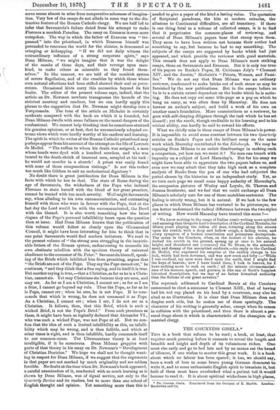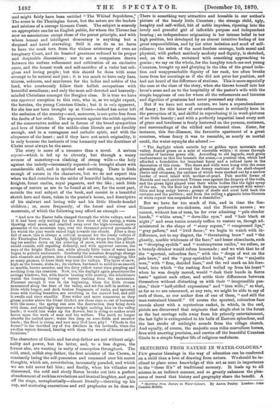THE COUNTESS GISELA.*
Tins is a book that refuses to be read ; a book, at least, that requires much pressing before it consents to reveal the length and breadth and height and depth of its voluminous riches. One must rise early and go to bed late and by no means eat the bread of idleness, if one wishes to master this great work. It is a book about which no labour has been spared ; it has, we should say, been a work of love to some brave young German democrat to write it, and to some enthusiastic English spirit to translate it, but both of them must have overlooked what a patient toil it would become to read it. It is about spiritual wickedness in high places, • The Countess Gisela. Translated from the German of E. Marlin. Landow. Macmillan and Co. and might fairly have been entitled "The Whited Sepulchres.: The scene is the Thuringian forest, but the actors are the leaders and minions of a corrupt German Court. The subject is scarcely an appropriate one for an English public, for whom the Throne has now no associations except those of the purest principle, and with whom honest and intelligent democracy is anything but a despised and hated starveling. Still it can do us no harm to have the mask torn from the vicious aristocracy of even an imaginary Court, and its boasted greatness reduced to its proper and despicable dimensions ; nor to see a comparison drawn between the surface refinement and cultivation of an exclusive caste, and the honest work and self-sacrifice of a ruder but reli- gious and loving people ; but this should be done with some attempt to be natural and just ; it is too much to have only liars, thieves, seducers, and murderers for the ladies and nobles of the land, who courteously follow their hellish occupations with beautiful seemliness; and only the most self-devoted and heavenly- minded Christians amongst the Burgher class. It is true we have one apparent exception to this rule, who is, as we might expect, the heroine, the young Countess Gisela ; but it is only apparent, for she has not been brought up at Court—indeed has never left the seclusion of the country—and, moreover, is not quite free from the faults of her order. The arguments against the selfish egotism of the conservative nobles and in favour of the broad sympathies and love of fairness of the middle-class liberals are put forcibly enough, and in a courageous and catholic spirit, and with the eloquence of the heart ; and if they have not much originality, it is only because the instincts of true humanity and the doctrines of Christ must always be the same.
The story is more of a romance than a novel. A serious expose—which is led up to cleverly, but through a weary avenue of monotony—a clashing of strong wills — the holy against the unholy—incessantly repeated—is brought about with considerable skill, and is spirited and exciting. There is little enough of nature in the characters, but we do not expect this when we find ourselves in the midst of beautiful ladies, mysterious knights, forest castles, royal pageants, and the like ; such little scraps of nature as are to be found at all are, for the most part, outside the real subject of the book, and consist in a beautiful -sketch here and there, taken in the pastor's house, and descriptive of his stalwart and loving wife and his little blonde-headed children ; or, more frequently, of the forest and river and mountain, of which the following may afford an example :— "And now the Easter hells clanged through the white valleys, and as if it had been only waiting for the first voice of the spring, a warm thawing wind arose, and rambled away over the high-towered, snowy pinnacles of the mountain tops, over the thousand-pointed pyramids of ice which the pine woods raised high towards the clouds. After a deep fall of snow, this is always a critical moment for the lonely valleys of the Thuringian Forest. Lightly, lightly, fall the drops from the glitter- ing ice needles down on the covering of snow, which lies like a blank shield outside, still repelling defiantly, and with apparent success, the rays of the bright March sun, while already little veins of water have began to pulsate underneath. Gradually the noiseless droppings change into channels and gutters, into a thousand little runnels, struggling, like so many gnomes, to force their way into the valleys. The layer of snow, high as the houses, sinks in ; its surface, hardened to solid ice as smooth as marble, bursts asunder, and the dirty yellow water rises gurgling and seething from the crannies. Now, too, the daylight again penetrates the cottage windows, but, with hearts beating with anxiety, the inhabitants watch the foaming throng of waters rushing from the mountains. Pleasant enough it was in the beginning, when the little stream murmured along the base of the valley, and set the mill in motion ; a little while longer, and dark broken fragments of rocks, and uprooted trees with trailing branches, are revolving in the narrow bed, and still it swells and rises steadily. Ever wider and more numerous as they gleam yonder above the forest thicket, are those rays so out of harmony with the scene ; the spring sun sees the destruction they bring down with them, and smilingly impresses a bright melting kiss on the valley lands ; it would fain wake up the flowers, but in doing so makes cruel havoc upon the work of man and his welfare. The earth no longer absorbs the melted snow; water lies deep on corn-fields and meadow lands ; the flood is rising, and now may God have pity ! ' Floods in the forest!' is the terrified cry of the dwellers in the lowlands, when the swollen waters descend, bearing with them the wreck of houses and of furniture."
The characters of Gisela and her step-father are not without origi- nality and power, but the latter, and, to a less degree, the former also, are wanting in unity of conception throughout. The cold, cruel, selfish step-father, the first minister of the Crown, is constantly losing the self-possession and command over his secret thoughts, which are, nevertheless, incessantly paraded, and which we are told never fail him ; and finally, when his villanies are discovered, the cold and steely Baron breaks out into a- perfect abandonment of reckless revelations and ironical laughter, and goes off the stage, metaphorically—almost literally—throwing up his cap, and scattering execrations and evil prophecies as he does so.
There is something very attractive and loveable in our author's picture of the lonely little Countess ; the strange child, ugly, haughty and self-willed, hilt of noble impulses, ripening into the lovely and graceful girl of inflexible purpose and independent bearing ; an independence originating in her intense belief in her high position, but developed by an almost intuitive feeling of her great responsibilities, and by her utter isolation and need of self- reliance; the union of the most fearless courage, both moral and physical, with perfect maidenly modesty and dignity, is sketched, and, on the whole, sustained with something approaching to genius ; we say on the whole, for the haughty touch-me-not young Countess, brought up and glorying in the idea of the grand isola- tion and unapproachable dignity of her rank, too often breaks loose from her moorings as if she did not prize her position, and had not heard of the difference of stations. This is more especially the case at the close of the story, when she throws herself into her lover's arms and on to the hospitality of the pastor's wife with the simple happiness of one for whom all the refinements and luxuries and dignities of greatness had never possessed any charm.
But if we have not much nature, we have a superabundance of fancy ; for this hater of over-refinement is evidently keen in the perception of it, and skilful in reproducing it in word-pictures
of no little beauty ; and with a perfectly impartial hand every sorb of grace and loveliness is freely bestowed on the persons, costumes, and surroundings of the vilified and detested class. Enter, for instance, this See-Zimmer, the favourite apartment of a great
countess, whose fancy it was to resemble, as nearly as mortal could, the water-nymphs she adored :-
" The daylight which outside lay so golden upon mountain and valley, floated green as a mist of emeralds within : it shone through curtains of lustrous green silk. According to old legends, such green enchantment as this lies beneath the ocean,—a poetical idea, which had afforded a foundation for luxuriant fancy and a refined taste in the decoration of this room. The doors and walls were hung with the same gleaming silk, and it covered the downy cushions of the shell-shaped chairs and ottomans, the outlines of which were marked out by a narrow border of wood inlaid with mother-of-pearl. Pale marble forms of Nereids and reed-environed Tritons rose against the drapery of the walls, and the green light played over their white bodies like the light spray of the sea. On the floor lay a dark Smyrna carpet covered with water- lilies and long sedgy leaves ; groups of shells and coral held back the curtains and the portiere ; and from the ceiling a gigantic lotoa-blossom of white crystal was suspended for a chandelier."
But we have far too much of this, and in time the See- Zimmer produces sea-sickness, and the Nereids nausea ; we cannot, without loss of tone, be for ever admiring " pale slender hands," " white arms," " dove-like eyes," and " hair black as night ;" and even tonics scarcely suffice to restore us, though ad- ministered in the shape of " stony repose," 46 compressed lips," " grey pallors," and " livid faces ;" we begin to watch with in- difference, not to say disgust, the " threatening brow " and " the ghastly, marble whiteness of the face;" and lesser stimulants, such as " drooping eyelids " and " contemptuous smiles," we refuse, as a brandy-drinker would refuse lemonade ; and we wish that he of the " spectral, colourless face," with the " drops of wet on the pale brow," and the " grey-sprinkled locks," and the " majestic man," with " firm, decided lines," and the red mark on his fore- head, into which "the rushing flood welled up from his heart" when he was deeply moved, would " dash their hands in fierce haste" against each other, and settle their differences between themselves without disturbing us with their " irrepressible pas- sion," their " half:stifled expressions" and "iron wills ;" so that, as far as we are concerned, at any rate, we might be able to say of each of them, as our author does of one of them, " and still the man restrained himself." Of course the spectral, colourless face travels about with a mysterious casket, in which, in the end, pistols are discovered that originate that single shot in the forest as the last carriage rolls away from his princely entertainment, the last light is extinguished in his halls of Eastern splendour, and the last stroke of midnight sounds from the village church. And equally, of course, the majestic man rides marvellous horses, fires with unerring precision, and carries off the beautiful Countess Gisela to a simple burgher life of religious usefulness.



































 Previous page
Previous page